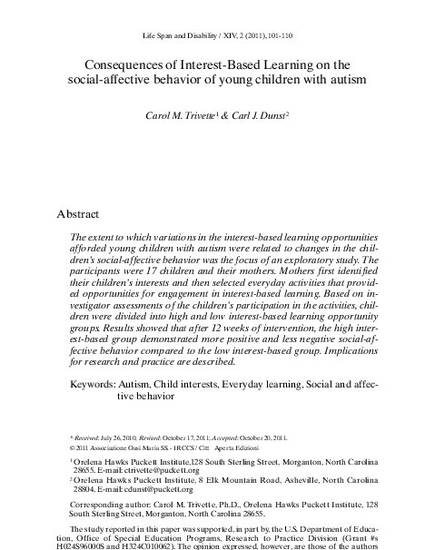
Article
Consequences of Interest-Based Learning on the Social-Affective Behavior of Young Children with Autism
Life Span and Disability
(2011)
Abstract
The extent to which variations in the interest-based learning opportunities afforded young children with autism were related to changes in the children’s social-affective behavior was the focus of an exploratory study. The participants were 17 children and their mothers. Mothers first identified their children’s interests and then selected everyday activities that provided opportunities for engagement in interest-based learning. Based on investigator assessments of the children’s participation in the activities, children were divided into high and low interest-based learning opportunity groups. Results showed that after 12 weeks of intervention, the high interest-based group demonstrated more positive and less negative social-affective behavior compared to the low interest-based group. Implications for research and practice are described.
Keywords
- autism,
- child interest,
- everyday learning,
- social and affective behavior
Disciplines
Publication Date
January 1, 2011
Publisher Statement
Users are allowed to read, download, copy, distribute, print, search, or link to the full texts of the articles, or use them for any other lawful purpose, without asking prior permission from the publisher or the author. This document was originally published in Life Span and Disability.
Citation Information
Carol M. Trivette and Carl J. Dunst. "Consequences of Interest-Based Learning on the Social-Affective Behavior of Young Children with Autism" Life Span and Disability Vol. 14 Iss. 2 (2011) p. 101 - 110 Available at: http://works.bepress.com/carol-trivette/14/
